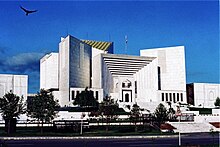Hamoodur Rahman | |
|---|---|
| حمود الرحمن হামুদুর রহমান | |
 Rahman (left) with Zulfikar Ali Bhutto | |
| Chairman of the Council of Islamic Ideology | |
| In office 2 February 1974 – 1 February 1977 | |
| President | Fazal Ilahi Chaudhry |
| Preceded by | Prof. Allama Allauddin Siddiqui |
| Succeeded by | Mohammad Afzal Cheema |
| 7th Chief Justice of Pakistan | |
| In office 18 November 1968 – 31 October 1975 | |
| Nominated by | Alvin Robert Cornelius |
| Appointed by | Ayub Khan |
| Preceded by | Fazal Akbar |
| Succeeded by | Yaqub Ali |
| Senior Justice of the Supreme Court of Pakistan | |
| In office 15 December 1960 – 31 October 1975 | |
| Appointed by | Ayub Khan |
| Vice-Chancellor of the Dhaka University | |
| In office 11 May 1958 – 14 December 1960 | |
| Chancellor | President of Pakistan |
| Preceded by | Muhammad Ibrahim |
| Succeeded by | Mahmud Hussain |
| Personal details | |
| Born | Hamoodur Rehman 1 November 1910 Patna, Bengal, British India (now in Bihar, India) |
| Died | 20 December 1981 (aged 71) Islamabad, Pakistan |
| Citizenship | British subject (1910–1947) Pakistan (1947–1981) |
| Nationality | Pakistani |
| Children | Hameedur Rahman Mahfoozur Rahman |
| Alma mater | University of Calcutta University of London Inns of Court School of Law |
| Profession | Jurist |
| Awards | |

Chief Justice Hamoodur Rahman (Urdu: حمود الرحمن; 1 November 1910 – 20 December 1981[1]), NI. HI, was a Pakistani Bengali jurist and an academic who served as the Chief Justice of Pakistan from 18 November 1968 until 31 October 1975.
Educated in law and trained as a jurist from the United Kingdom, he chaired the War Enquiry Commission to investigate the causes of the Bangladesh Liberation War that led to the creation of Bangladesh.[2] In addition, Rehman served as a law professor in the faculty of Karachi University and vice-chancellor of University of Dhaka while remaining active in promoting literacy across the country. After the independence of Bangladesh, Rehman's family retained Pakistan's citizenship and his son served as the Chief Justice of Islamabad High Court.[3]
Chief Justice Rahman remained a respected figure in Pakistan's judiciary, and is hailed for his honesty and patriotism that Senior Justice Khalil-ur-Rehman Ramday once publicly noted that "his Commission was the most honourable commission that was investigated by a Bengali Chief Justice, in spite of East-Pakistan disaster."[4] His findings, which exposed the Bangladesh genocide and recommended charges for senior Pakistani officials, were never made public as the report was muzzled by the Bhutto administration under the guise of harming civil-military relations.
- ^ Cite error: The named reference
All-Pakistan Legal Decisionswas invoked but never defined (see the help page). - ^ Hamoodur Rehman Commission of Inquiry into the 1971 War (2000). The report of the Hamoodur Rehman Commission of inquiry into the 1971 war: as declassified by the Government of Pakistan. Vanguard. ISBN 9789694023519. Retrieved 22 August 2016.
{{cite book}}: CS1 maint: numeric names: authors list (link) - ^ "ISLAMABAD HIGH COURT". www.ihc.gov.pk. Archived from the original on 17 March 2015. Retrieved 22 August 2016.
- ^ Lahore Bar Association. "A Great Name in History:Chief Justice Hamoodur Rahman". www.facebook.com. Lahore Bar Association. Archived from the original on 26 February 2022. Retrieved 22 August 2016.